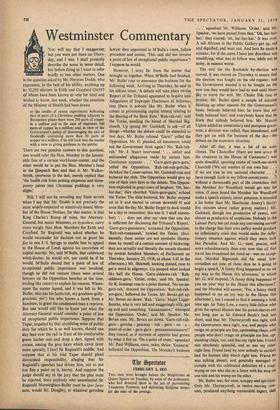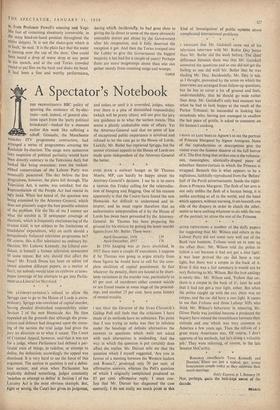Westminster Commentary
to the results of recent experiments indicating that in parts of a Christmas pudding adjacent to threepenny pieces there were 250 parts of copper in a million and in the case of sixpences 360 parts of copper in a million; and, in view of the Government's policy of discouraging the sale of foodstuffs containing more than 20 parts of copper in a million, if he will look into the matter with a view to giving guidance to the public.
There are two possible answers to this question; one would refer the Hon. Member to the lament- able fate of a certain workhouse-master, and the other would be to put the Hon. Member's head in the Despatch Box and shut it. Mr. Walker- Smith, courteous to the last, merely replied that `the health risk from putting sixpences and three- penny pieces into Christmas puddings is very slight.'
Still, I will not be revealing any State secrets when I say that Mr. Dodds is not precisely the most widely-respected or attentively-heard Mem- ber of the House. Neither, for that matter, is that King Charles's Rump of mine, the Attorney- General, but senior Ministers, ex hypothesi, carry more weight than Hon. Members for Erith and Crayford. Sir Reginald was asked whether he would reconsider his decision not to grant his fiat to one J. S. Spriggs to enable him to appeal to the House of Lords against his conviction of capital murder. No, said M'Bulla, that celebrated witch-doctor, he would not, nor could he if he would. M'Bulla denied that a point of law of exceptional public importance was involved, though he did not venture (there were several lawyers on the Opposition benches at the time, smiling like razors) to explain his reasons. Where- upon the matter lapsed, and it was left to Mr. Butler, who has his faults (oh, my goodness-golly- gracious, yes!) but who knows a hawk from a handsaw, to grant the condemned man a reprieve. But one would still like to know just what the Attorney-General would consider a point of law of exceptional public importance. Suppose that Taper, impelled by that unyielding sense of public duty for which he is so well known, should one day lean over the rail in front of his comfortable green leather seat and drop a dart, tipped with curare, among the grey hairs which cover (ever more sparsely, I fear) Sir Reginald's noddle. And suppose that at his trial Taper should plead diminished responsibility, alleging that Sir Reginald's speeches had driven him, not to put too fine a point on it, barmy. And suppose the judge should say to the jury that the plea must be rejected, since anybody who assassinated Sir Reginald Manningham-Buller must be ipso facto sane, would Mr. Doughty, or whatever gormless
lawyer they appointed in M'Bulla's room, follow precedent and intone, 'This case did not involve a point of law of exceptional public importance'? I suppose he would.
However, I stray far from the matter that brought us together. When M'Bulla had finished, Mr. Butler rose to announce the business for the following week. Arriving at Thursday, he said in his silkiest tones, 'A debate will take place on the Report of the Tribunal appointed to Inquire into
Allegations of Improper Disclosure of Informtion [there is nobody like Mr. Butler when it
comes to pronouncing capital letters] relating to the Raising of the Bank Rate.' Rah-rah-rah,' said the Tories, smelling the blood of Marshal Big- mouth. Up sprang Mr. Gaitskell, to ask—of all things—whether the debate could be extended to two days. Mr. Butler refused. 'Gam!' yelled the Opposition. Mr. G. pleaded, all innocence; could not the Government think again? No. `Rah-rah-
rah.' Mr. J. Stuart intervened. . . unfair and unfounded allegations made by certain hon. Gentlemen opposite . . ."Garn-garn-garn-garn,' yelled the Opposition. 'Rah-rah-rah-gertcha,' shrieked the Conservatives. Mr. Gaitskell rose and buttered the slide. The Opposition would give up one of their own days to the debate. The Opposi- tion exploded in great roars of laughter. 'Oh, har- har-har,' they chortled. 'Gam-gam-gam,' echoed the Tories. The slide buttered, Mr. Butler stepped on to it and started to careen downhill (I said once that the day Mr. Butler forgot to duck would be a day to remember; this was it; I shall remem-
ber). . . does not alter my view that one day is sufficient for discussing the Tribunal's Report.' `Garn-garn-gaaaaaarn,' screamed the Opposition. `Rah-rah-raaaaaaah; howled the Tories. (Inci- dentally, these noises are not symbolic illustra- tions by myself of a certain amount of bickering; they are actually and literally the sounds shouted by several hundred Members of Parliament on Thursday, January 23, 1958, at about 3.45 in the afternoon.) Mr. Shinwell, looking pained, rose to get a word in edgeways. Up jumped what looked like half the House. 'Garn-siddown-rah."Rah- siddown-garn."Order, order,' said Mr. Speaker. Sir R. Jennings rose to a point thereof. 'No-no-no- garn-rah,' shouted the Opposition. 'Rah-rah-rah- yes-garn; bellowed the Tories. Mr. Bevan got up.' Mr. Bevan sat down. `Rah.' Garn.' Major Legge- Bourke, who is very tall and staggeringly silly, got up and said something. `Gaaaaaaaarn!' whooped the Opposition. 'Order,' said Mr. Speaker. Mr. Bevan rose. Mr. Bevan sat down. 'Garn-rah-rah- garn - gertcha - getaway - rah - garn - on - a point-of-order - garn-garn - gaaaaaaaaaaaaaarn!' they roared, as if increase of appetite had grown by what it fed on. 'On a point of order,' squeaked Mr. Paul Williams, once, twice, thrice. `Gaaaarn,' bellowed the Opposition. 'On Monday's business
. . .' squeaked Mr. Williams. 'Order,' said Mr. Speaker, 'we have passed from that."Oh, har-har- har,' they roared; `oh, har-har-har.' It was over. A tall African in the Public Gallery got up, sad and dignified, and went out. And here he made a mistake; for if the scene I have just described w‘ s unedifying, what was to follow was, while not so noisy, in essence worse.
The writ for the Rochdale by-election w moved. It was moved on Thursday to ensure Eh; the election was fought on the old register; ha the Government wanted it to be fought on a new one they would have had to wait until WI day to move the writ. Mr. Chuter Ede rose protest; Mr. Butler spent a couple of minute thinking up other reasons for the Government haste. Nobody believed him; he knew that n( body believed him; and everybody knew that l• knew that nobody believed him. Mr. Marct Lipton added an unnecessary and pompous grace note, a division was called, then abandoned, an they got on with the business of the day—tt debate on the economic situation.
After all that, it was a bit of an anti- climax. The Chancellor (there are now seven of the creatures in the House of Commons!) was quite dreadful, spouting reams of reach-me-down Churchill ('We are masters of our own fate . . • if we are true to our national character . . . have enough faith in my fellow-countrymen . without a thousandth part of the conviction that the Member for Woodford would get into his voice. (1 once heard the Member for Woodford make a speech entirely about potatoes; it sounded a lot better than Mr. Heathcoat Amory's thirty- five minutes about rather graver matters.) MI • Gaitskell, though less productive of yawns, was almost as productive of scepticism. Nobody in the Labour Party has yet made any convincing answer to the charge that their own policy would produce an inflationary crisis that would make the defla- tionary situation against which they warn look like Paradise. And Mr. G.—neat, precise, and more schoolmasterly than ever now that all that travel has broadened his mind so—was no excep- tion. Marshal Bigmouth did his usual low- comedian act (one of these days he is going to begin a speech, 'A funny thing happened to me on my way to the House this afternoon,' to which Mr. G. will respond, 'A funny thing happened to you on your way to the House this afternoon?' and the Marshal will answer, 'Yes, a funny thing happened to me on my way to the House this afternoon'), but I ceased to find it amusing a long
time ago. Sir Toby Low, a merry little fellow who gives the optical illusion that his jacket-sleeves are
too long, just as Sir Edward Boyle's look too short, said that Mr. Thorneycroft was right, and the Government were right, too, and people who resign on principle are fine, upstanding chaps, and people who ,don't resign on principle are line, up- standing chaps, too, and that my right hon. Friend was absolutely splendid, and so was my other right hon. Friend (and by now nobody in earsho had the faintest idea which right hon. Friend hl was talking about), and generally managed t( comply with the celebrated definition of a mug wump as one who sits on a fence with his mug or one side and his wump on the other.
Mr. Butler was, for once, scrappy and spiritless Only Mr. Thorneycroft, in twelve moving min utes, produced anything memorable (apart, tlaa
it d ie
0
a is from Professor Powell's amazing and Yogi- like feat of remaining absolutely immovable, in the same head-on-hand position throughout the entire debate), `It is not the sluice-gate which is at fault,' he said. 'It is the plain fact that the water is coming over the top of the dam.' One could have heard a drop of water drop at any point in his speech, and at the end Tories crowded round to patiilm on the back and shake his hand. It had been a fine and worthy performance, during which, incidentally, he had gone close to giving the lie direct to some of the more obviously untenable stories put about by the Government after his resignation, and it fully 'deserved the reception it got. And then the Tories trooped into the Lobby to give the Government the biggest majority it has had for a couple of years! Perhaps there are more mugwumps about than one can gather merely from counting mugs'and wumps.
TAPER







































 Previous page
Previous page